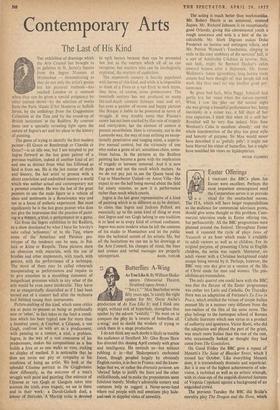Butterflies A-Wing
'"JOLLY," 'Max Beerbohm wrote fifty years ago, 'is surely the right epithet for Mr. Oscar Asche's -production of As You Like It; and I think one might, without risk of hyperbole, strengthen that epithet by the adverb "awfully."' He went on to compare the play to 'a swarm of butterflies all a-wing,' and to doubt the wisdom of trying to catch them in a stage production.
I do not think any such doubt is likely to trouble the audiences at Stratford. Mr. Glen Byam Shaw has directed this shining April comedy with grace and intelligence. He reminds us—but without rubbing it in—that Shakespeare's enchanted forest, though peopled largely by obviously English rustics, is in fact in France; and the know- ledge that we, or rather the dramatis personce, are 'abroad' helps to justify the lions and the other unlikelihoods, and to make the preposterous seem fabulous merely. Motley's admirable scenery and costumes help to suggest a Never-never-land where real people with real emotions play hide- and-seek in dappled vistas of unreality. The acting is much better than workmanlike. Mr. Robert Harris is an autumnal, orotund Jaques. Mr. Richard Johnson is an exceptionally good Orlando, giving this conventional youth a rough assurance and with it a hint of the in- calculable. Mr. Mark Dignam makes Duke Frederick an incisive and astringent villain, and Mr. Patrick Wymark's Touchstone, clinging in exile to the cosy snobbery of the servants' hall, is a sort of Admirable Crichton in reverse; thUs, one feels, might Sir Bernard Docker's cabin steward behave after a shipwreck. Mr. James ivVellman's Adam (grumbling, long before trade unions had been thought of that people did not work like they used to) was another good per- formance.
By great bad luck, Miss Peggy Ashcroft had partly lost her voice when the season opened. When I saw the play on the' second night she was giving a beautiful performance but, being inevitably in a minor key, it fell short of her true capacities. I think that when all is well her Rosalind will be very fine indeed. Miss Jane Wenham's Celia is excellent already; and the whole interpretation of the play has great style and honesty of purpose. Sir Max would never have described it as `ovfully jolly'; it might not have blurred his vision of butterflies, but it might have modified his views on lepidopterists.
PETER FLEMING






























 Previous page
Previous page